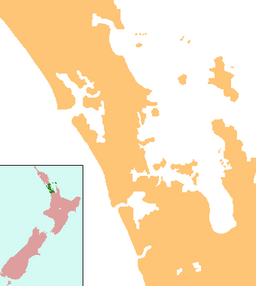Lake Rototoa
| Lake Rototoa | |
|---|---|
 Lake Rototoa | |
 | |
| Location | Auckland Region, North Island |
| Coordinates | 36°30′49″S 174°14′15″E / 36.5135°S 174.2375°E |
| Basin countries | New Zealand |
| Surface area | 1.39 km2 (0.54 sq mi)[1] |
| Max. depth | 26 m (85 ft) |
Lake Rototoa (formerly Lake Ototoa) is located at the northern end of the south head of the Kaipara Harbour in the Rodney ward of the Auckland Region, New Zealand.[2] With a surface area of 1.39 km2 and a maximum depth of 26 m, it is the largest and deepest of a series of sand-dune lakes found along the western coastline of the North Island.[3]
Its name was changed from Lake Ototoa to Lake Rototoa in 2013.[4] Rototoa translates as 'Lake of the Warrior', and is part of a line of lakes known as 'the Footsteps of Kawharu' after the warrior Kawharu who fought with the Ngāti Whātua tribe against the resident Waiohua, Ngaririki and Kawerau tribes in the late 17th to early 18th centuries.[5]
Biodiversity

The lake is an important wildlife habitat for a number of New Zealand bird species, including the New Zealand grebe, New Zealand scaup and grey duck. The lake is vegetated with Typha orientalis and Eleocharis sphacelata.[6]
See also
References
- ^ Rowe, D. K. "Distribution and conservation status of the dwarf inanga Galaxias gracilis (Teleostei: Galaxiidae) an endemic fish of Northland dune lakes" (PDF). Journal of The Royal Society of New Zealand, Vol. 27, Nr. 2, June 1997, p. 231. Archived from the original (PDF) on 21 July 2011. Retrieved 9 October 2010.
- ^ "Place name detail: Lake Rototoa". New Zealand Gazetteer. New Zealand Geographic Board. Retrieved 17 March 2018.
- ^ New Zealand. Dept. of Scientific and Industrial Research, (1976). New Zealand journal of marine and freshwater research, Vol. 10, p. 43. ISSN 0028-8330
- ^ "Ngāti Whātua o Kaipara Claims Settlement Act 2013 No 37 (As at 30 January 2021), Public Act 81 Name change for Crown protected area – New Zealand Legislation".
- ^ Sheffield, Colleen M. (September 1962). "Te Taou and the Sandhills". www.teaohou.natlib.govt.nz. Retrieved 28 February 2024.
- ^ Cameron, Ewen; Hayward, Bruce; Murdoch, Graeme (2008). A Field Guide to Auckland: Exploring the Region's Natural and Historical Heritage (rev. ed.). Random House New Zealand. p. 130. ISBN 978-1-86962-1513.

